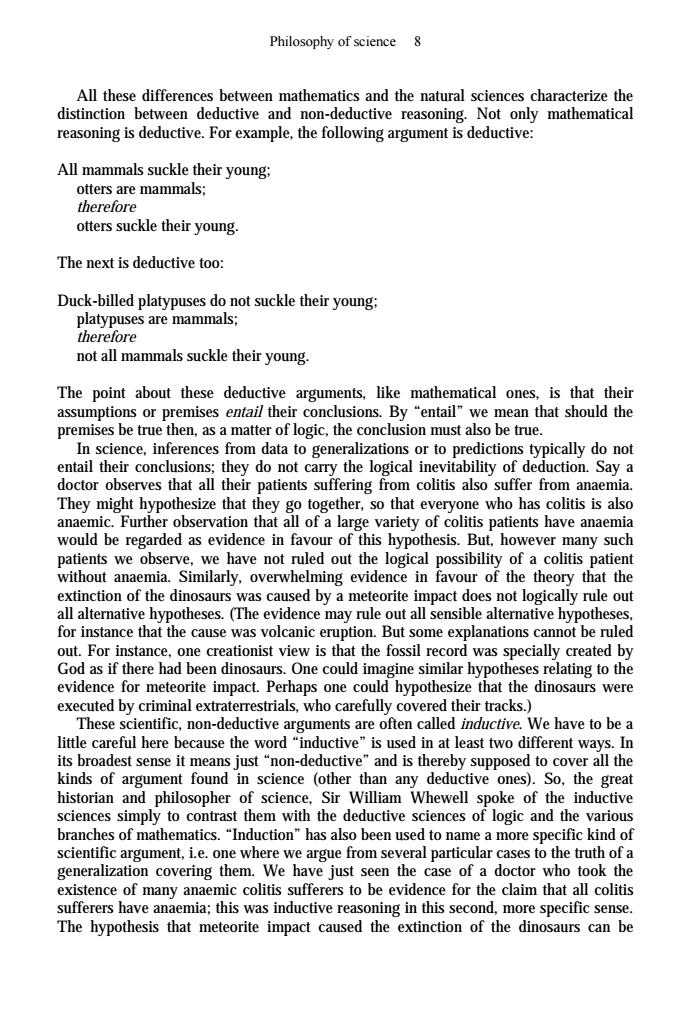正在加载图片...

Philosophy of science 8 All these differences between mathematics and the natural sciences characterize the distinction between deductive and non-deductive reasoning.Not only mathematical reasoning is deductive.For example,the following argument is deductive: All mammals suckle their young; otters are mammals; therefore otters suckle their young. The next is deductive too: Duck-billed platypuses do not suckle their young; platypuses are mammals; therefore not all mammals suckle their young. The point about these deductive arguments,like mathematical ones,is that their assumptions or premises entail their conclusions.By "entail"we mean that should the premises be true then,as a matter of logic,the conclusion must also be true. In science,inferences from data to generalizations or to predictions typically do not entail their conclusions;they do not carry the logical inevitability of deduction.Say a doctor observes that all their patients suffering from colitis also suffer from anaemia. They might hypothesize that they go together,so that everyone who has colitis is also anaemic.Further observation that all of a large variety of colitis patients have anaemia would be regarded as evidence in favour of this hypothesis.But,however many such patients we observe,we have not ruled out the logical possibility of a colitis patient without anaemia.Similarly,overwhelming evidence in favour of the theory that the extinction of the dinosaurs was caused by a meteorite impact does not logically rule out all alternative hypotheses.(The evidence may rule out all sensible alternative hypotheses, for instance that the cause was volcanic eruption.But some explanations cannot be ruled out.For instance,one creationist view is that the fossil record was specially created by God as if there had been dinosaurs.One could imagine similar hypotheses relating to the evidence for meteorite impact.Perhaps one could hypothesize that the dinosaurs were executed by criminal extraterrestrials,who carefully covered their tracks.) These scientific,non-deductive arguments are often called inductive.We have to be a little careful here because the word "inductive"is used in at least two different ways.In its broadest sense it means just"non-deductive"and is thereby supposed to cover all the kinds of argument found in science (other than any deductive ones).So,the great historian and philosopher of science,Sir William Whewell spoke of the inductive sciences simply to contrast them with the deductive sciences of logic and the various branches of mathematics."Induction"has also been used to name a more specific kind of scientific argument,i.e.one where we argue from several particular cases to the truth of a generalization covering them.We have just seen the case of a doctor who took the existence of many anaemic colitis sufferers to be evidence for the claim that all colitis sufferers have anaemia;this was inductive reasoning in this second,more specific sense. The hypothesis that meteorite impact caused the extinction of the dinosaurs can beAll these differences between mathematics and the natural sciences characterize the distinction between deductive and non-deductive reasoning. Not only mathematical reasoning is deductive. For example, the following argument is deductive: All mammals suckle their young; otters are mammals; therefore otters suckle their young. The next is deductive too: Duck-billed platypuses do not suckle their young; platypuses are mammals; therefore not all mammals suckle their young. The point about these deductive arguments, like mathematical ones, is that their assumptions or premises entail their conclusions. By “entail” we mean that should the premises be true then, as a matter of logic, the conclusion must also be true. In science, inferences from data to generalizations or to predictions typically do not entail their conclusions; they do not carry the logical inevitability of deduction. Say a doctor observes that all their patients suffering from colitis also suffer from anaemia. They might hypothesize that they go together, so that everyone who has colitis is also anaemic. Further observation that all of a large variety of colitis patients have anaemia would be regarded as evidence in favour of this hypothesis. But, however many such patients we observe, we have not ruled out the logical possibility of a colitis patient without anaemia. Similarly, overwhelming evidence in favour of the theory that the extinction of the dinosaurs was caused by a meteorite impact does not logically rule out all alternative hypotheses. (The evidence may rule out all sensible alternative hypotheses, for instance that the cause was volcanic eruption. But some explanations cannot be ruled out. For instance, one creationist view is that the fossil record was specially created by God as if there had been dinosaurs. One could imagine similar hypotheses relating to the evidence for meteorite impact. Perhaps one could hypothesize that the dinosaurs were executed by criminal extraterrestrials, who carefully covered their tracks.) These scientific, non-deductive arguments are often called inductive. We have to be a little careful here because the word “inductive” is used in at least two different ways. In its broadest sense it means just “non-deductive” and is thereby supposed to cover all the kinds of argument found in science (other than any deductive ones). So, the great historian and philosopher of science, Sir William Whewell spoke of the inductive sciences simply to contrast them with the deductive sciences of logic and the various branches of mathematics. “Induction” has also been used to name a more specific kind of scientific argument, i.e. one where we argue from several particular cases to the truth of a generalization covering them. We have just seen the case of a doctor who took the existence of many anaemic colitis sufferers to be evidence for the claim that all colitis sufferers have anaemia; this was inductive reasoning in this second, more specific sense. The hypothesis that meteorite impact caused the extinction of the dinosaurs can be Philosophy of science 8